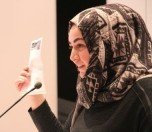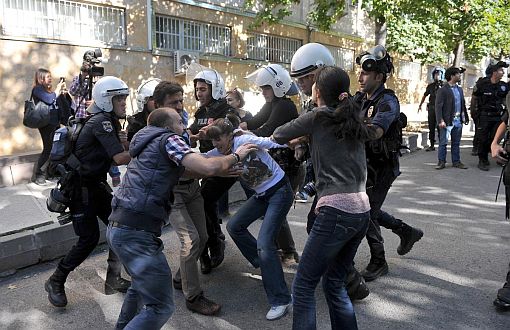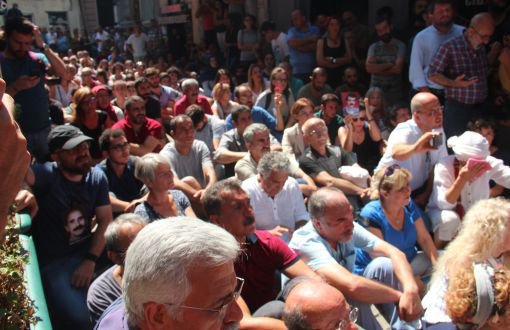Click here to read the article in Turkish / Haberin Türkçesi için buraya tıklayın
The Syrian refugees leaving Syria because of the civil war and that taking the risk to go to Europe by not willing to stay in Turkey are on the world’s agenda.
But, what about the ones willing to stay in Turkey? What are their reasons to prefer Turkey, their living conditions, difficulties they run into and their expectations?
I am in a three-decker bookstore named “Pages”.
There are the owner, Samer Al Kadri and worker Rawad Al Samman in addition to a young Argentinian lady named Sofia Nicolini Llosa. I come to learn that Llosa has come to Turkey to work with children from Turkey and Syria to conduct the final leg of an event organizing artistic activities with children from 32 countries.
For Al Kadri and Al Samman, the reason why they prefer Turkey is culture in Turkey being similar to Syria in addition to fancying İstanbul.
İstanbul because…
Al Kadri is a fine arts graduate and graphics designer. He is the owner of publishing house named Bright Fingers that publishes children books in Damascus. They moved first to Jordan and then to Turkey in 2012 with his two children and his wife, who is a children book writer after the war has broken out.
He says the top reason to prefer İstanbul is their love towards the city:
“I never wanted to be in Europe. Europe hasn’t been an option for me. Especially for my children, it wouldn’t be easy to return to Syria from Europe, it is much easier to return from here.
“People from Turkey and Syria are very much alike. Nothing has changed for us since we arrived in. I really like İstanbul”.
Al Samman as well has come to İstanbul through a similar journey. He is graduated from Faculty of Law. The first stop was Jordan after leaving Damascus in 2012. He has been in Turkey over a year with his wife and 2-year-old child. His wife is a English Literature graduate and teaching Syrian children English courses.
“Similarity” has played an important role in choosing İstanbul where they visited plenty of times as tourists before, as they say.
“You are a guest but cannot return once you leave”
They tell even though liking İstanbul and similarity in cultures have influenced their preference, there are still difficulties. Vagueness in law, the status of being guest, issues in work and education come top. All these cause uncertainty and anxiety about future.
“The government has done a lot for us. They admitted us without visa, a large number of people have come from Syria. The government told us ‘you are guests’. That is a good thing but a problem at the same time”, Al Kadri explains.
“My future is uncertain here. I can do anything I want but I am a guest, there are no laws to protect me. I need laws. I want to know my rights and rules, just like the citizen of Turkey, they know their rights and duties.
“Legal uncertainty is a serious problem. Many Syrians loving İstanbul and willing to remain here have left for Europe for this reason. You have a certain income in Europe, you get a passport, and you know you might receive work permit even after 5 or 7 years.
“There are many people sharing my condition. They gave a document to an actress friend of mine who wanted to go to Beirut on a business trip for a week, stating she ‘cannot return for a year once she goes out of the country’. You are a guest but cannot return once you leave.
“If some other government comes to power that doesn’t like Syrians might say ‘You all go back to Syria’. We don’t have any assurance for future”.
“I need to know my rights and rules”
Al Kadri believes tensions that occurs from time to time between people from Turkey and Syria rest on this lack of legal assurance.
“You say ‘You are a guest at my home. You may use my home for a week or two’. But you get angry if you use your home like mine after two weeks, on the other hand I get nervous if I don’t use it as mine. If you tell me of your rules, then it is fine. We will both be comfortable, as I know the rules. I need to know my rights and rules.
“I fear to have any sort of issues with a Turk. What are my rights? What happens if I accidentally step on someone’s foot on bus, that person gets angry and we start fighting?”
“I’ve got money yet can’t rent a house”
Al Samman’s problems he run into ranging from renting a house to official talks are all exemplary.
“I couldn’t rent a house in my name as I am a Syrian. A Turkish friend of mine did it on my behalf. The renters are very polite. They told me ‘We don’t have a problem with you, but we just don’t rent to Syrians’. They liked me in time but didn’t change their mind.
“We’ve got everything including home, car, work in Damascus. I am in İstanbul now. I’ve got money, don’t want to sleep on streets, want to rent a house but there should be a law that protects us from hearing words that hurt us in this process. Maybe that person is also afraid of me as laws concerning me are not known”.
“I pay tax yet don’t have a work permit”
.jpg)
Work permit is a whole another issue. Al Kadri states even though he has a workplace in his name and pays tax, he can’t obtain a work permit.
“If I want to receive a work permit, I need to leave Turkey for a period of time between three and six months and then return to apply the permit within 10 days. My children go to school, what is going to happen to them here? It is not possible for me to do that. I feel locked in here.
“Lots of İstanbul lover Syrians would have stayed rather than going to Europe if they could obtain a work permit. Germany accepts Syrians because there are working, educated young people. No one asks to be paid by the government without working.
“In Turkey, all Syrians work as well but without assurance in black market.
“I have preferred here over Europe but I sometimes think if Europe is a better option for my future and children. I always feel in fear. I want to stay but I need to know my rights and need to have a work permit.
“Our rights are in Turkish”
Al Samman too says “One needs to work to live” but draws attention to difficulty of dealing with legal process.
“There are rights concerning us but they are all published in Turkish newspapers. Our rights are released in Turkish. When I went to the police office for residence permit, they were all speaking in Turkish. It is the same in immigration office. I speak a bit of Turkish so I came to realize I needed to fill a form on website. When I excitedly logged in to the page, I saw that it was in Turkish as well.
“In university, the announcement hanged on the wall saying ‘Those don’t speak Arabic shall apply this or there’ in Arabic, we were laughing at it. The same happens here, but now a whole nation is face to face with it instead of a 100 students.
“I don’t have any problems with the law, the issue is to maintain equality. There is law against us but none to protect. Channels should be opened between Syrians in Turkey and the government and these channels should be in both Turkish and Arabic, just to understand”.
Education?
Education is another important title. Al Kadri explains his two children go to private Syrian schools. Language and integration are two major problems for the children.
“Government of Turkey tells people to send their children to Turkish schools but if I do, the children will be in the same classes as Turkish children without learning to speak the language. This is difficult for the children. Classes may be opened that teach Syrian children Turkish for a year. The education might proceed with the Turkish children the following year”.
University stage is another problem. His child is only 2 years old and goes to a kindergarten but explains the issue that he will face 15 years later as he is experiencing now. He also has the concern of preserving the mother tongue while learning to speak Turkish.
“Turkish has started to replace my daughter’s mother tongue after she started going to school. We are pleased that she speaks Turkish but we don’t want her to forget speaking her mother tongue. Her mother speaks in English, and I speak in Arabic”.
“We need to understand each other”
While Al Samman says “Damascus is always there, we are on a long vacation now” as to returning to Syria, Al Kadri says “I will return to Syria but not after the war is over but after [Bashar al] Assad is gone. If the war ends and Assad wins, I won’t go back”.
Furthermore, he emphasizes the importance of an environment in this place where people from different nationalities touch each other. He draws attention to the role of proximity and touching in both understanding each other and dress wounds of the war.
“I didn’t open this place to live here forever. I don’t make money from this place either. We, people from Turkey and Syria are very similar. If I leave, this place should remain. This place is not for Syrians only. Syrians should understand Turkish culture, and people from Turkey should understand Arabic culture. The future will bring us side by side; we need to understand each other. This place is a small step. If 10 Turks come and learn Arabic culture each month, and we learn writers, artists, musicians from Turkey, then that is good”. (BK/TK)





.jpg)


.jpg)
.jpg)


